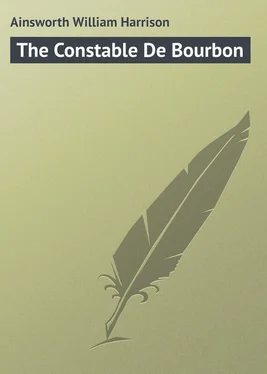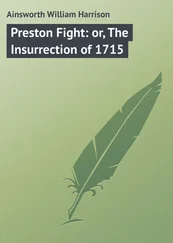William Ainsworth - The Constable De Bourbon
Здесь есть возможность читать онлайн «William Ainsworth - The Constable De Bourbon» — ознакомительный отрывок электронной книги совершенно бесплатно, а после прочтения отрывка купить полную версию. В некоторых случаях можно слушать аудио, скачать через торрент в формате fb2 и присутствует краткое содержание. ISBN: , Жанр: foreign_prose, на английском языке. Описание произведения, (предисловие) а так же отзывы посетителей доступны на портале библиотеки ЛибКат.
- Название:The Constable De Bourbon
- Автор:
- Жанр:
- Год:неизвестен
- ISBN:http://www.gutenberg.org/ebooks/49681
- Рейтинг книги:3 / 5. Голосов: 1
-
Избранное:Добавить в избранное
- Отзывы:
-
Ваша оценка:
- 60
- 1
- 2
- 3
- 4
- 5
The Constable De Bourbon: краткое содержание, описание и аннотация
Предлагаем к чтению аннотацию, описание, краткое содержание или предисловие (зависит от того, что написал сам автор книги «The Constable De Bourbon»). Если вы не нашли необходимую информацию о книге — напишите в комментариях, мы постараемся отыскать её.
The Constable De Bourbon — читать онлайн ознакомительный отрывок
Ниже представлен текст книги, разбитый по страницам. Система сохранения места последней прочитанной страницы, позволяет с удобством читать онлайн бесплатно книгу «The Constable De Bourbon», без необходимости каждый раз заново искать на чём Вы остановились. Поставьте закладку, и сможете в любой момент перейти на страницу, на которой закончили чтение.
Интервал:
Закладка:
“In a week, then?” demanded the king.
“Perchance in a week, sire,” replied the physician. “But he must travel slowly, for even then he will be very feeble.”
“Come hither, sir,” said the king, taking Jean de l’Hôpital aside. “Answer me truly, as you value your life. What ails the Constable?”
“His highness is labouring under a severe quotidian ague, caught at Montbrison,” replied the physician. “The fever has proved of singular obstinacy, and will not yield to ordinary remedies. We are under great apprehensions,” he added, lowering his voice, “that it may be followed by some mortal ailment, as consumption, or the black jaundice. His state is exceedingly critical, and demands the utmost care. Were he to take cold, I would not answer for his life.”
“Hark ye, sir,” said the king. “I know you can speedily cure him, if you will. Within a week I expect to see him at Lyons.”
“I cannot perform impossibilities, sire,” replied the physician; “but if it be in the power of medical skill to further your majesty’s desires, you shall behold him at the time appointed.”
Apparently satisfied, François then turned towards the Constable, and said:
“Adieu, cousin. I commend you to the care of your physician. But as I shall naturally be anxious to hear how you progress, I will leave behind me the Seigneur Perot de Warthy, who will send me daily tidings of you.”
“That is needless, sire,” said Bourbon, impatiently.
“Since you are pleased to express so much anxiety about me, I will despatch frequent messengers to you with the reports of my physicians.”
“I prefer leaving Warthy,” rejoined the king. “I can depend on him. Once more adieu, cousin. We shall meet again at Lyons.”
And, offering his hand to Diane, he led her out of the room.
VII. PEROT DE WARTHY
Scarcely were they gone, when Bourbon sprang to his feet, and gave vent to an outburst of rage.
“By Heaven! I have had enough to do to play my part!” he exclaimed.
“I pray your highness to calm yourself!” cried Jean de l’Hopital. “His majesty may return.”
“I wish he would return!” exclaimed Bourbon. “I was a fool to allow him to depart. But I must take instant counsel with my friends.”
So saying, he thrice struck a small bell placed upon the table.
At the summons, a secret door opened, and a dozen young seigneurs, all of whom were armed, issued from a closet where they had been concealed. These persons were Bourbon’s most devoted partisans, and comprised the Seigneurs Pomperant, François du Peloux, Tansannes, Espinat, Sainte-Bonnet, Desguières, Brion, and five others. “We have been impatiently awaiting the signal to come forth,” said Pomperant. “But it seems our services were not required. I am sorry your highness allowed the king to depart.”
“You shall hear what has occurred, and judge whether I have acted wisely,” rejoined Bourbon.
And he then proceeded to relate what had passed between him and the monarch.
“I would not trust him!” exclaimed Tansannes. “His promises are worthless. How say you, messeigneurs?” he added to the others. “Are you not of my opinion?” There was a unanimous reply in the affirmative.
“It is not too late,” said Pomperant. “We may yet secure his person. Entrust the matter to me. We have force enough to overpower the royal guard.”
“The opportunity is tempting, I own,” said Bourbon. “But the plan is too hazardous. It occurred to me while the king stood before me – but I rejected it.”
“You did well, prince,” remarked Saint-Vallier, who had entered the chamber by the same door that had admitted his daughter. “If you had seized the king, your own doom would have been certain.”
“Who would have pronounced the sentence?” remarked Pomperant, sternly. “I repeat, it is not too late to secure the king. Your highness has but to say the word, and it shall be done.”
“Ay, we are ready to execute your highness’s orders, be they what they may,” added the others.
“Are you all mad?” exclaimed Saint-Vallier. “Know you not that the archers of the royal guard are in the court of the château? – that the Duke de Longueville has four troops of light horse drawn up outside the gates? – that the town is invested by two thousand lansquenets, under the command of the Grand-Master? Any such attempt must end in discomfiture.”
“We can carry off the king before his capture is discovered,” said Pomperant.
“Impossible!” cried Saint-Vallier.
“You are lukewarm in the cause, cousin,” said Bourbon. “Perhaps you may feel differently when I inform you that his majesty designs to take your daughter, the Comtesse de Maulévrier, with him to Lyons.”
“Ha!” exclaimed Saint-Vallier, as if struck by a sharp pang. “Rather than this should be, I would consent to his capture.”
“Who is mad now, M. le Comte?” remarked Pom-perant. “Will you entrust the beautiful Diane to this profligate monarch?”
“No, I would sooner see her perish,” rejoined Saint-Vallier. “I will agree to any plan.”
At this moment a warning exclamation was uttered by the physician who was stationed near the door.
At the signal, Bourbon hastily resumed his gown, and flung himself upon the couch.
Scarcely were these preparations completed, when Perot de Warthy and the Comte de Maulévrier entered. They both glanced suspiciously at the band of young seigneurs, who had withdrawn to the back of the chamber.
Saint-Vallier alone remained standing near the couch on which Bourbon was extended.
“What is your business with me, sir?” demanded the Constable of Warthy.
“I am enjoined by his majesty to remain in constant attendance upon your highness,” replied the other, bowing.
“This fellow troubles me,” muttered Bourbon; “I must get rid of him.”
“Louis,” said Saint-Vallier to his son-in-law, “I am glad you have come hither. I was about to seek you. You must take back Diane to Normandy.”
“I cannot comply with your request,” replied Maulévrier. “I return to the Château de Brézé forthwith.”
“So much the better,” cried Saint-Vallier. “Diane must accompany you.”
“Impossible,” replied Maulévrier. “She is gone with the Comtesse de Chateaubriand and the king to Lyons.”
“Gone!” exclaimed Bourbon, starting up. “Has the king set out? I thought he meant to pass the night here?”
“He has changed his mind, and has just quitted the château with his suite.”
“And you have allowed Diane to accompany him?” demanded Saint-Vallier, with a look of agony.
“Mort-Dieu! I could not prevent it,” replied Maulévrier – “even if I had the wish,” he added to himself.
Saint-Vallier made no remark, but it was easy to perceive his anguish.
Greatly excited by the unlooked-for intelligence, Bourbon could scarcely rest upon the couch.
“I cannot comprehend why the king should depart so suddenly,” he said to Warthy. “Has he taken the troops with him?”
“No,” replied the other. “He is only attended by the archers of the royal guard, and the young nobles forming his retinue. The Grand-Master and the Duke de Longueville are left behind with their men.”
“For what purpose?” demanded Bourbon, sternly.
“To keep guard upon the château and the town,” replied Warthy.
Bourbon exchanged a glance with his followers, which did not pass unobserved by Warthy.
“His majesty’s parting order,” remarked that vigilant personage, “was that no one – not even your highness – should be allowed to quit the château till to-morrow.”
“Ha! By Saint Paul, it would seem we are prisoners, messeigneurs!” exclaimed the Constable, fiercely.
Читать дальшеИнтервал:
Закладка:
Похожие книги на «The Constable De Bourbon»
Представляем Вашему вниманию похожие книги на «The Constable De Bourbon» списком для выбора. Мы отобрали схожую по названию и смыслу литературу в надежде предоставить читателям больше вариантов отыскать новые, интересные, ещё непрочитанные произведения.
Обсуждение, отзывы о книге «The Constable De Bourbon» и просто собственные мнения читателей. Оставьте ваши комментарии, напишите, что Вы думаете о произведении, его смысле или главных героях. Укажите что конкретно понравилось, а что нет, и почему Вы так считаете.












